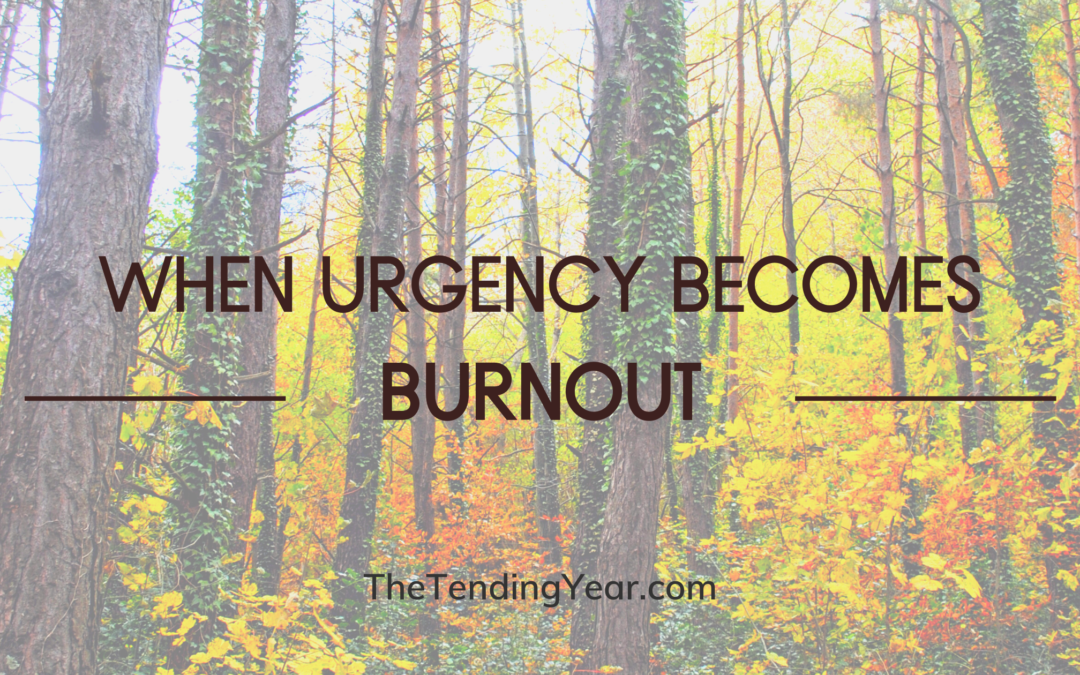My September goal for The Third Tending Year was Noticing and Choosing (read my Noticing post here). When it came time to investigate my Choosing practices, I found myself inundated with choices. New responsibilities sprouted up overnight, each one vying for my attention and threatening disaster if I didn’t figure it all out quickly.
With so many decisions to make, every task felt urgent and high stakes. Three wedding vendors need answers! The dog is sick, gotta take her to the vet! Bills are due! You ran out of supplements, gotta go to the natural foods store, but oh no, THEY’RE out of them, too! In my effort to knock everything out I overtaxed my body and brain and burned out.
If you’re a longtime reader, you know that I use Rachael Stephen’s brilliant “Constellation System” to organize my life into six domains: Divitiae (paid work and money), Corporalis (physical body), Spiritus (spirituality and mental health), Domum (home), Genero (creativity), and Socialis (relationships).
Because I hyperfocused on managing my Divitiae, Socialis, and Domum responsibilities, I ignored the other domains that help me holistically care for myself: Corporalis, Genero, and Spiritus. As Stephen said in my interview with her, it’s not as if all six domains are meant to be equal, each one taking up 16.66% of your time, energy, and focus. Life ebbs and flows, truly urgent responsibilities sometimes pop up, but I’m learning that it’s important to differentiate the must-dos when everything feels time-sensitive.
On Urgency and Burnout
In an effort to understand my current relationship with urgency, I returned to Tema Okun’s generous resource “White Supremacy Culture,” which includes a sense of urgency as a characteristic of white supremacy culture. I found my experience of overload in Okun’s list of the ways urgency shows up: “makes it harder for us to distinguish what is really urgent from what feels urgent; after a while everything takes on the same sense of urgency, leading to mental, physical, intellectual, and spiritual burnout and exhaustion.”
I also listened to to Pico Iyer’s 2015 “On Being” podcast episode, aptly named “The Urgency of Slowing Down.” In his interview, Iyer describes the stillness he inhabits when he goes on retreats to monasteries, the timelessness of his workdays as a writer, and the go-go-go urgency when he travels to places like Los Angeles or New York for work.
I resonated with his description of his days spent leisurely reading and writing at home without looking at the time. I rarely time block my work schedule (i.e., draft newsletter from 9-11am; lunch 11am-12pm; emails 12-12:30pm, etc.). Instead, I focus on must-do tasks, batch some for certain days around a handful of meetings each week, and check them off during my 10am-4pm workdays. It took me years to develop my personal productivity rhythm, and in general my work practices don’t burn me out.
But I did burn out, and it wasn’t from work. It was from life: my dog had a health scare, wedding planning felt like quicksand, I ran out of three meds to treat my chronic illness, Kris was out of town and I had to do errands alone. On their own, these things are doable; all together, the priorities sparred.
Choosing Urgency or Something Else
Once I realized I was burned out, I decided that something would need to give. Inspired by Okun’s writing and Iyer’s podcast episode, I asked myself three questions.
- What is truly urgent?
- What carries a false sense of urgency?
- What happens when I treat these non-urgent tasks as urgent?
Looking at the last few weeks, only two things landed on my truly urgent list: responding to my elderly dog’s needs and paying my bills and rent.
The second question was illuminating. Things that felt urgent but truly were not were doing many loads of laundry in one day, checking my email between 4pm and 10am, doing a certain number of workouts in a week, and most wedding planning decisions, especially sending emails.
And the effects of treating non-urgent tasks as urgent are feeling exhausted, uncomfortable, and shameful that in my effort to get all the things done I did not take care of my mental and physical health. I know these emotions and experiences aren’t unique to me because 1) many chronically ill friends and acquaintances share similar experiences on social media and 2) most of my coaching clients reach out to work with me when they hit a rock bottom of overwhelm and exhaustion from never-ending to-do lists that leave them little to no time for rest and self-care.
So where does that leave me, heading into October? I finally ordered those meds, took Lucy the chihuahua to the vet, and delegated some non-urgent tasks. We’re 95% ready for the wedding, and I wisely blocked off two weeks in October to do little except prepare, celebrate, and decompress.
Takeaways
I want to recommend a resource that helps me to put urgency into perspective: Jen Carrington’s blog post “The Eight Seasons of Business.” She wrote this piece for small business owners, but I think the metaphor of seasons is applicable to life, too. Are you in a season of growth, rest, recovery, burnout, or something else? What is truly urgent in this season of your life? What carries a false sense of urgency? What happens when you believe those non-urgent tasks are urgent? How can you be compassionate with yourself as you navigate the season you’re in?
You can read more about my coaching practice here, sign up for my newsletter below, or book a session here.

